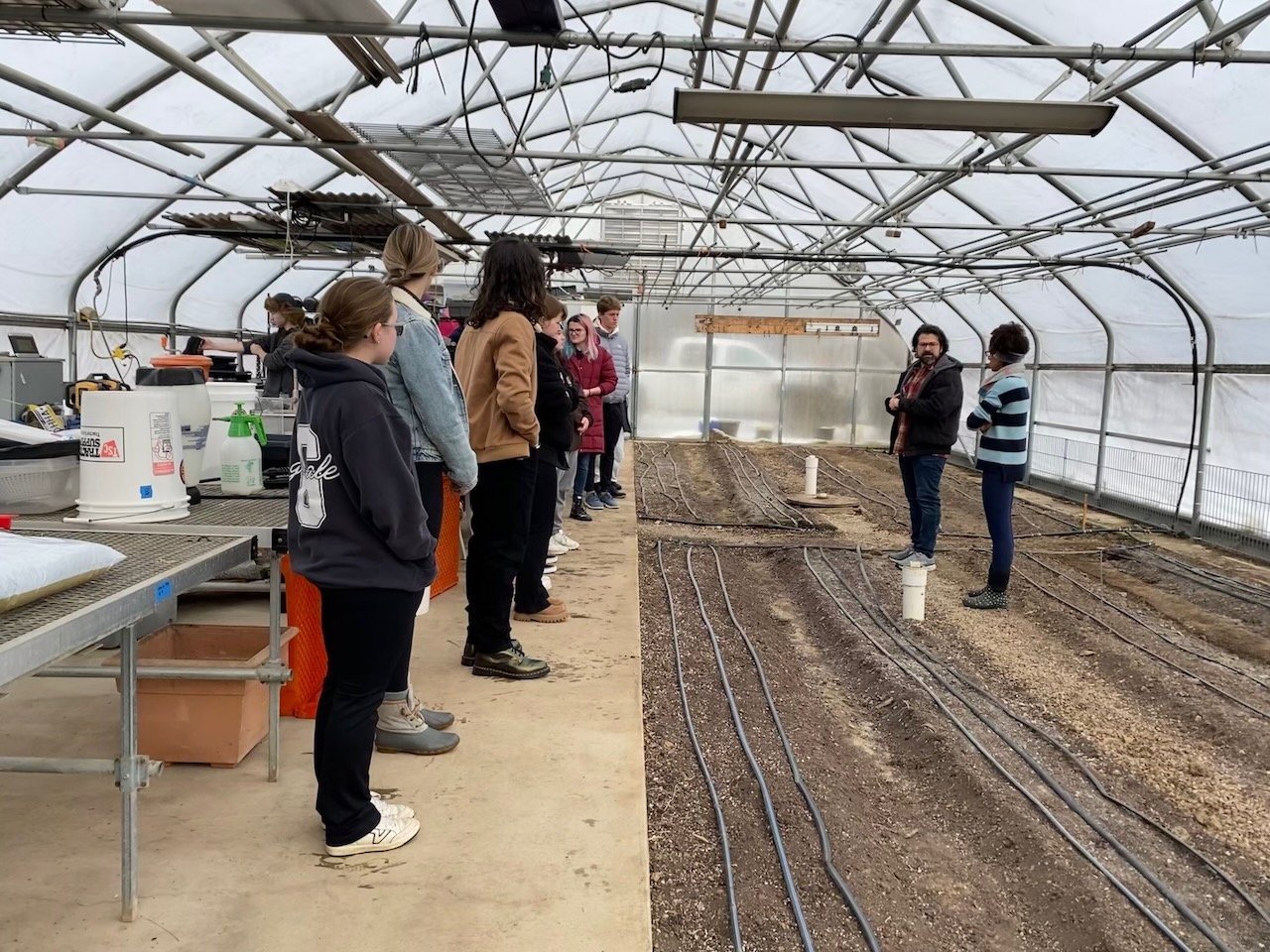Planting Seeds in the Depths of Winter—Thanks to the Solar High Tunnel
The solar high tunnel stays warm on a cold winter day. (Mick Stinelli)
Temperatures were below freezing, but that didn’t stop a class of students in the Solar High Tunnel at Eden Hall Campus from planting seeds—spinach, lettuce, kale, and Swiss chard, all arranged in plastic trays.
It was the middle of winter, but the soil was warm and fragrant.
Part of what helps the high tunnel maintain temperature throughout the different seasons are its walls; they’re programmed to retract upwards, like a garage door, to the top of the structure. A sensor lets them know when to lift during hot days and drop once the internal temperature goes back down.
Vents on either end of the cylindrical structure also help push air through the tunnel. That’s especially important to prevent disease in the crops. There’s also electric lamps and mats that help the seeds stay warm during winter months with cold temps and little sunlight. Even the concrete floor of the tunnel is warmed by a heating system, as are two of the crop beds, which take up half of the structure.
Professor Christopher Murakami, second from right, and Eden Hall Farm Manager Indira Ortiz, first on right, prepare undergraduate students to seed varieties of leafy green vegetables. (Mick Stinelli)
While students filled trays with seeds, those crop beds on the floor of the tunnel had none. Production here was temporarily halted, partially because growing during the winter can sometimes attract pests.
Indira Ortiz, Eden Hall’s farm manager, said she and her team were trying to keep away unwanted critters and give the soil a rest, so it could come back healthier for a new set of crops.
“This is the perfect time to clean up and prepare ourselves for the next growing season,” Ortiz said. She expected to move some vegetables and other plants to the crop beds by the end of the next month.
One of the students helping Ortiz was Katy Morgan ’24, who majors in environmental science. She said she started working on the farm in 2023 with no knowledge of agriculture.
“The farm was a really good opportunity for me, and also a lot of my friends, to get hands-on experience working with all different kinds of crops,” Morgan said.
Food studies student Lindsey Disler, MAFS ’25, was also there. Disler used to run a community-supported agriculture (CSA) program. Even with a few years of farming experience under her belt, Disler found there was still plenty to learn at Eden Hall, like the benefits of no-till practices, and how to use a tractor.
“It’s important for us to give [students] real experience with what being organic means.”
“It’s been really nice to have an environment where you can practice and experiment, and the stakes aren’t so high,” Disler said, adding that she enjoyed getting to learn how to work with so many different crops, like cucamelons—a grape-sized fruit that tastes like cucumbers.
“Because we don’t have the pressure of producing for a specific amount of yield, we get to test different varieties and see what works best for us,” Ortiz said. That ability to try new things and learn from them not only provides diverse educational experiences for students and farm workers, but it pushes forward the sustainable mission of Eden Hall by allowing them to try all sorts of organic methods of farming.
“Because we’re organic, we need to be smart about how we rotate our crops, because we need to control pests,” Ortiz added. “It’s going to be our third year incorporating flowers.” That helps not only to bring in pollinators, but those bees and other insects will keep some of the unwanted bugs away.
Being organic also means complying with expected regulations, something Ortiz likes to make sure students understand. “It’s important for us to give them real experience with what being organic means,” she said. It’s more than just a marketing term or a word on a food packaging label.
Students work water into soil during a class in the Solar High Tunnel. (Mick Stinelli)
Disler said watching the certification process required to pass federal audits for organic farms has been one of the most helpful lessons as she hopes to return to running her own CSA program. “It really demystified a lot of the anxiety around the paperwork you have to present and how to talk to the auditor about your production processes,” she said.
For Morgan, who’s in her final semester of undergraduate education, working at Eden Hall not only taught her about the hands-on practices of farming, but it also gave her experience in communicating with other farm workers.
“One important thing I learned when I was working on the farm— I was really nervous to start here as somebody who never had that experience before,” Morgan said. “But everybody was so welcome and so open to teach me how to do things. I even got help from other students who had already been working on the farm.”
Mick Stinelli is a writer and digital content specialist at Chatham University. His writing has previously appeared in the Pittsburgh Post-Gazette, 90.5 WESA, and WYEP.org.



